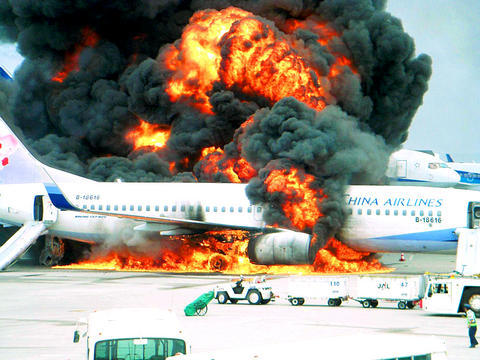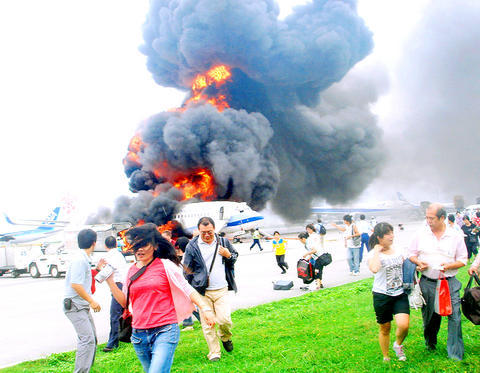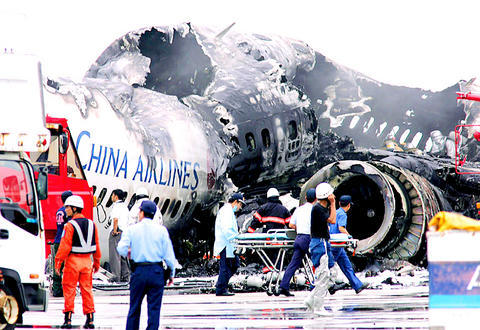A China Airlines Boeing 737-800 airliner burst into flames yesterday moments after landing on the Japanese island of Okinawa after all 165 passengers and crew made a dramatic escape.
Flames and giant plumes of black smoke erupted from the jet just after it landed at Naha Airport after a flight from Taipei.
"When we looked out the window, everything was covered with fire," an unidentified male passenger told reporters.

PHOTO: AP
"I saw several passengers evacuate the plane using a chute. After a minute or so, I heard the sound of an explosion. It was a big explosion," said Tadahiro Hasuo, who told Japanese TV network NHK he felt the heat of the blast while passing Naha airport in a taxi.
Video shot by an eyewitness and broadcast on TV showed passengers sliding down two chutes on the right side of the plane, while flames and thick black smoke billowed from the left.
Early investigations in Okinawa raised the possibility that leaking fuel may have caused the blaze.

PHOTO: AP
"We don't have any information that suggests the accident was linked to terrorism. There is a possibility of the engine catching fire and exploding due to a fuel leak," a Naha airport police official said.
One member of the ground crew had been injured, Kyodo news agency reported.
The flight landed using standard procedures and taxied to the designated gate, China Airlines spokesman Johnson Sun (孫鴻文) said at a news conference. The captain was later informed by the ground crew that one of the plane's engines was on fire and all 157 passengers and eight crew members were immediately evacuated by the emergency chutes, Sun said.

PHOTO: EPA
"We are very sorry and regret the accident," he said.
Following the explosion, the Civil Aviation Administration (CAA) and Aviation Safety Council (ASC) held press conferences in Taipei to assuage public fears.
CAA Director-General Billy Chang (張國政) said that based on Taiwan's Aviation Occurrence Investigation Act (飛航事故調查法), the authority to investigate the accident lay in Japan's Aircrafts and Railway Accidents Investigation Commission (ARAIC).
Nonetheless, the administration has formed a special task force and immediately dispatched three CAA officials to Japan to assist officials from the ARAIC in the investigation.
Chang said that the nation had 15 Boeing 737-800 model planes, 12 of which are owned by China Airlines, including the plane that burned in Okinawa. Two belong to Mandarin Airlines and one, Air Force One, is owned by the Air Force. He said that these planes had been grounded by the CAA for further inspection.
Chang said the plane that had caught fire was only five years old and had just completed its routine maintenance on July 13. He said that a preliminary investigation showed the flight's captain was informed by ground staff about the fire after the plane landed at the airport.
Meanwhile, four ASC representatives arrived at Okinawa yesterday evening to start working with ARAIC and China Airline representatives to identify the cause of the explosion.
China Airlines, Taiwan's largest carrier, purchased the B737-800 passenger jet in July 2002. The company uses the B737-800s in its fleet to fly mainly short-haul Asian routes.
James Fang (方粵強), the director of the ASC's investigation department, told the Taipei Times that this type of incident had never occurred in the past.
Most of the Taiwanese passengers on the plane had been on package tours arranged by four travel agencies in Taiwan -- South East Travel Service (東南旅行社), Gloria Tours (喜美旅行社), Daiei Travel Service (大榮旅行社) and Mic Travel Co (萬達旅行社). Their luggage was destroyed in the fire.
China Airlines said it would compensate passengers NT$1,000 per kilogram of luggage, with a maximum compensation of NT$20,000 in accordance with civil aviation regulations. Compensation for the passengers' mental suffering had not been decided.
China Airlines has a patchy safety record and this is the carrier's fourth accident in 13 years.
After devoting huge resources to improving safety and regaining public confidence, the company was starting to see some positive results.
Despite high aviation fuel costs, the company posted a net income of NT$738.35 million (US$22.5 million), or NT$0.20 per share, last year. Company chairman Philip Wei (魏幸雄) said its operating costs were lower because of a lower insurance premium, which was 45 percent less than what the carrier used to pay, because of its better flight safety record.
But the carrier is once again under fire over the accident in Okinawa. The airlines' already ailing finances will be also affected by the loss. For the first quarter of the year, the carrier reported a loss of NT$805.83 billion, or negative NT$0.21 per share.
Following the accident, China Airlines president Ringo Chao (趙國帥) led a team to Okinawa.
During a press briefing last night, Chao said he regretted the accident and appreciated the aid offered by Japanese authorities.
Chao also said the company was uncertain of the cause of the explosion and would rely on the findings of investigators.
The last accident involving China Airlines was on May 25, 2002, when a Boeing 747-200 broke up and crashed into the sea near the Penghu Islands 20 minutes after takeoff from Taipei on a flight to Hong Kong. The crash caused the death of all 206 passengers and 19 crew members.
Meanwhile, the Air Force yesterday said that it would carry out stricter maintenance on Air Force One, which is also a 737-800.
"Because of a request from the Civil Aeronautics Administration, we will carry out a special detailed check on the aircraft as soon as possible," said Lieutenant General Jason Liu (
Additional reporting by Jimmy Chuang

MISINFORMATION: The generated content tends to adopt China’s official stance, such as ‘Taiwan is currently governed by the Chinese central government,’ the NSB said Five China-developed artificial intelligence (AI) language models exhibit cybersecurity risks and content biases, an inspection conducted by the National Security Bureau (NSB) showed. The five AI tools are: DeepSeek, Doubao (豆包), Yiyan (文心一言), Tongyi (通義千問) and Yuanbao (騰訊元寶), the bureau said, advising people to remain vigilant to protect personal data privacy and corporate business secrets. The NSB said it, in accordance with the National Intelligence Services Act (國家情報工作法), has reviewed international cybersecurity reports and intelligence, and coordinated with the Ministry of Justice Investigation Bureau and the National Police Agency’s Criminal Investigation Bureau to conduct an inspection of China-made AI language

LIMITS: While China increases military pressure on Taiwan and expands its use of cognitive warfare, it is unwilling to target tech supply chains, the report said US and Taiwan military officials have warned that the Chinese People’s Liberation Army (PLA) could implement a blockade within “a matter of hours” and need only “minimal conversion time” prior to an attack on Taiwan, a report released on Tuesday by the US Senate’s China Economic and Security Review Commission said. “While there is no indication that China is planning an imminent attack, the United States and its allies and partners can no longer assume that a Taiwan contingency is a distant possibility for which they would have ample time to prepare,” it said. The commission made the comments in its annual

CHECKING BOUNDARIES: China wants to disrupt solidarity among democracies and test their red lines, but it is instead pushing nations to become more united, an expert said The US Department of State on Friday expressed deep concern over a Chinese public security agency’s investigation into Legislator Puma Shen (沈伯洋) for “secession.” “China’s actions threaten free speech and erode norms that have underpinned the cross-strait ‘status quo’ for decades,” a US Department of State spokesperson said. The Chongqing Municipal Public Security Bureau late last month listed Shen as “wanted” and launched an investigation into alleged “secession-related” criminal activities, including his founding of the Kuma Academy, a civil defense organization that prepares people for an invasion by China. The spokesperson said that the US was “deeply concerned” about the bureau investigating Shen

‘TROUBLEMAKER’: Most countries believe that it is China — rather than Taiwan — that is undermining regional peace and stability with its coercive tactics, the president said China should restrain itself and refrain from being a troublemaker that sabotages peace and stability in the Indo-Pacific region, President William Lai (賴清德) said yesterday. Lai made the remarks after China Coast Guard vessels sailed into disputed waters off the Senkaku Islands — known as the Diaoyutai Islands (釣魚台) in Taiwan — following a remark Japanese Prime Minister Sanae Takaichi made regarding Taiwan. Takaichi during a parliamentary session on Nov. 7 said that a “Taiwan contingency” involving a Chinese naval blockade could qualify as a “survival-threatening situation” for Japan, and trigger Tokyo’s deployment of its military for defense. Asked about the escalating tensions